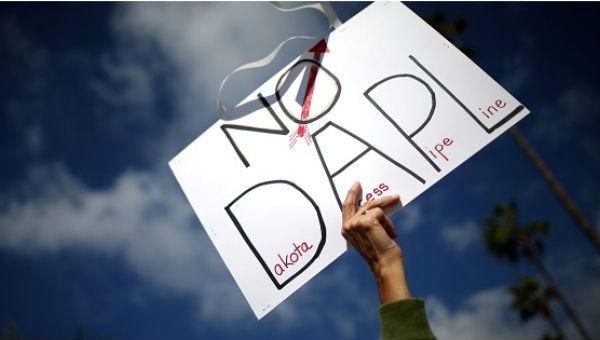Dakota Access oil pipeline: Global day of protest against US government decision greenlighting project
The cause has attracted protesters from around the world

Opponents of controversial oil pipeline they claim is threatening an indigenous community’s water supply, have called for a global day of action after the project was given the green light by an agency of the US government.
The campaign to stop the North Dakota Access Pipeline captured the imagination of people from around the world, and last December the Army Corps of Engineers announced it was halting permission for the project to pass close to the Standing Rock Sioux Reservation.
But following the signing of an executive order by Donald Trump that cleared the way for that pipeline and another project, the Corps, an agency of the Department of Defence, said it would let the $3.8bn project proceed.
Opponents of the pipeline on Wednesday called for protests around the world. In the US, actions are taking place from New Hampshire to California.
“Trump is not Obama. He has put billionaires into key positions. He has friends on Wall Street,” Daryl Frazier, a spokesperson for Honour the Earth, one of a coalition of groups that is opposing the pipeline, told The Independent.

“We’re tying to fight against big money. Big money doesn’t care about protect the water supply. That is what the protests were about.”
The 1,200-mile pipeline will transfer oil from the Dakotas to a shipping point in Illinois. Energy Transfer Partners, the company that has almost completed the project, wants the pipeline to pass beneath the Missouri River close to the site of the Standing Rock Sioux reservation near the town of Cannon Ball.
“The Indigenous Coalition at Standing Rock is calling for February 8th to be an international day of emergency actions to disrupt business as usual and unleash a global intersectional resistance to fossil fuels and fascism. Connect with other struggles. Think long-term movement building. We are in this for the long haul,” says a message posted on the SacredStoneCamp website
“The Standing Rock Sioux Tribe has consistently asked for people to go home, and we understand this. Regardless, water protectors remain on the ground at the Sacred Stone Camp, determined to stop the black snake, and we support them.”
It adds: “If you go, expect police violence, mass arrests, felony charges for just about anything, abuse while in custody, targeted persecution and racial profiling while driving around the area, etc.”
The Army intends to cancel further environmental study and allow the Lake Oahe crossing, according to court documents the Justice Department filed that include letters to members of Congress from Deputy Assistant Army Secretary Paul Cramer.
The Standing Rock Sioux, whose reservation is just downstream from the crossing, fears a leak would pollute its drinking water. The Associated Press, said the tribe had led protests that drew hundreds and, at times, thousands of people who dubbed themselves “water protectors” to an encampment near the crossing.
An assessment conducted last year determined the crossing would not have a significant impact on the environment. However, then-Assistant Army Secretary for Civil Works Jo-Ellen Darcy on December 4 declined to issue permission for the crossing, saying a broader environmental study was warranted.
Environmentalist Bill McKibben said that decision by Mr Trump’s government was a sign “they are are casual racists with no sense of American history and that they will do anything the oil industry tells them to do”
He addd: “Along with Flint, this is the most remarkably blatant example of environmental racism in years."
Join our commenting forum
Join thought-provoking conversations, follow other Independent readers and see their replies
Comments
Bookmark popover
Removed from bookmarks